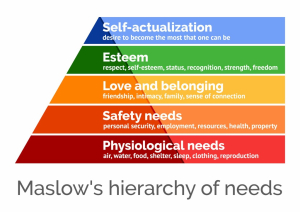Cultivating a culture that encourages lasting relationships
Have you ever been employed in a toxic work environment?
During that time, did you find it hard to do your job?
Was it hard to complete tasks and be productive?
How did the environment impact your emotional state and your mental health?
Maybe it was difficult to stay focused, or maybe you never felt appreciated. Maybe your boss was always yelling at you, and nothing you did was good enough. It was a job you dreaded going to. Every morning, you had to drag yourself out of bed and get ready for the day. Knowing what you were about to endure put you in a bad mood from the start.
All you could think about was getting through the day so you could come back home. And here’s the big question: how long did you stay at that job?
If you’ve ever been in a negative work environment, then you know exactly what we’re talking about. And as difficult as this may be to read, nannies endure toxic work environments too.
They pick up on the energy in the home — the lack of communication or the constant bickering with your partner. They feel the tension or the stress that may be floating around your home.
Unfortunately, nannies are disrespected, undervalued, and unsupported all the time. They try to do their job but are unable to do so because of well-meaning, yet overbearing parents. You may be thinking, well, that’s not me. My nanny loves it here.
However, there may be things you don’t realize you’re doing that are adding extra stress to your nanny as they attempt to do their job. Our hope with this article is to shed some light on circumstances that make a difficult work environment for nannies.
Below, we’ve listed some tips on how to create a positive work environment for nannies that will ensure the longevity of their employment.
How do you foster a positive work environment and meet your nanny’s needs?
We want to note that meeting your nanny’s needs doesn’t have to be complicated. What it boils down to is being respectful and thoughtful, listening, and having open communication with your nanny.
Your nanny works in your home every day, often for 8-12 hours at a time. They don’t get to leave for a lunch break or shut themselves away in an office for some privacy. They are constantly busy and engaged.
If they’re not caring for your children, then they’re working on laundry and other household tasks.
In addition, many parents work from home, which can make nannies’ jobs much harder. Many parents don’t understand hanging around can make a nanny’s job more difficult, particularly, if a child gets worked up when they see their parents.
Sometimes parents don’t have enough confidence in their nanny to let them do their job and will interfere if they’re around. Interfering when a nanny is handling a situation causes your children to not respect your nanny or see them as an authority. Not only does this make your nanny feel undermined and disrespected, but it also makes it much harder for them to do their job.
Maslow’s hierarchy of needs demonstrates the needs of a nanny beautifully. Maslow’s theory is that all humans have the same basic needs that must be met. They’re divided into two categories, deficiency and growth needs. The first four — physiological, safety, love and belonging, and esteem — are deficiency needs, with the last — self-actualization — being a growth need.
Maslow believed that the needs lower on the pyramid must be met before those higher up can be achieved. This means you must take care of your basic physical needs before you can move on to your growth needs.

Your nanny needs a positive environment in your home. When nannies are stressed, undervalued, and not cared for, they leave to find a better position. Not making an effort to meet your nanny’s needs by providing the appropriate environment leads to many short-lived placements.
Here are a few ways you can create a positive work environment for nannies.
A relaxed and thoughtful environment
We never mean to put pressure on you that your home must be perfect to employ a nanny. Working in a private space like your home, it’s inevitable that nannies are exposed to personal moments and situations that are not ideal at some point in their careers.
Nannies understand what they’re signing up for by choosing this job. However, that doesn’t mean you can’t do your best to prepare your home for your nanny. One way you can do that is by ensuring the environment is relaxed for your nanny.
Getting rid of extra tension before your nanny arrives is ideal. Whether you have a disagreement with your partner or something else, it’s best to work it out before your nanny starts work for the day. Or, at the very least, avoid arguments in the presence of your nanny.
Your home is your nanny’s “office”. They don’t have anywhere else they can go for their lunch or breaks. Doing your best to make your home relaxing for your nanny goes a long way in the job they’re there to do. You can have snacks provided for them, instructions for them to rest when the kids are napping, or anything else that might help their day go by a little easier.
Your nanny will appreciate your thoughtfulness.
Positive and open communication
Working with anyone brings up disagreements. It’s simply a part of relationships. Employing a nanny is no different. In fact, you may find more things to discuss with a nanny. Topics like child discipline, parenting styles, and cleaning methods are a few of the things you may have to talk with your nanny about on a regular basis.
Both parties need to feel an openness to respectfully discuss issues when they arise without receiving judgment from one another. It’s best if you and your nanny have a scheduled time you meet — once a week or a couple of times a month. This gives you the opportunity to ask your nanny how they feel things are going and to bring up any concerns you have, as well. Remember, it’s important you give your nanny the space to express how they feel too, without being afraid of censure from you.
Respect and confidence in their abilities
In order for your nanny to do their job well, they must know you have confidence in their abilities and respect for their position.
Imagine your boss constantly watching over your shoulder as you work, occasionally reaching down and inserting themselves into whatever it is you’re doing. They have no problem stopping you in the middle of a task to let you know you’re doing it wrong and taking it from you.
Can you imagine lasting in a work environment like that?
A nanny can’t last in a position where there’s no respect. Unfortunately, we’ve seen it happen time and time again, and families end up with a revolving door of candidates. If you want your nanny to stick around, you must show them the respect they deserve.
What does this look like? One example is if your nanny is working through a tantrum with your child and you’re around, resist the urge to step in. Respect your nanny enough to know they are capable and confident in the job you’ve given them to do.
Trust them to handle it efficiently and with care for your child. Let them know you respect them by not hanging over their shoulder, wondering what it is they’re doing and how they’re doing it.
You’ve hired a professional to take care of your family and your home. Let them do their job. If you need to take your car to the mechanic, you don’t hang around the whole time, hovering over the mechanic to see what they’re doing, right? You trust they’re going to fix your car. The same should be true for your nanny.
In short, simply treat your nanny with kindness and compassion. Provide them with the respect they deserve, and don’t forget to let them know how much you value them.
Hello, Nanny! can help you provide the ideal environment for a lasting placement
Do you still have questions? You want to give your nanny a positive work environment, but the thought overwhelms you.
We get it. As a prior career nanny and a boss mom with an employed nanny, we have a few tips and tricks on how to create the kind of work environment that makes a nanny want to stick around.
We’d love to provide suggestions on how to improve your home, communication with your nanny, your working agreement, or anything else you may be struggling with to help strengthen your relationship with your nanny.
We’d love to hear from you. Reach out to us here, or click here to start the process of finding your own perfect fit.











